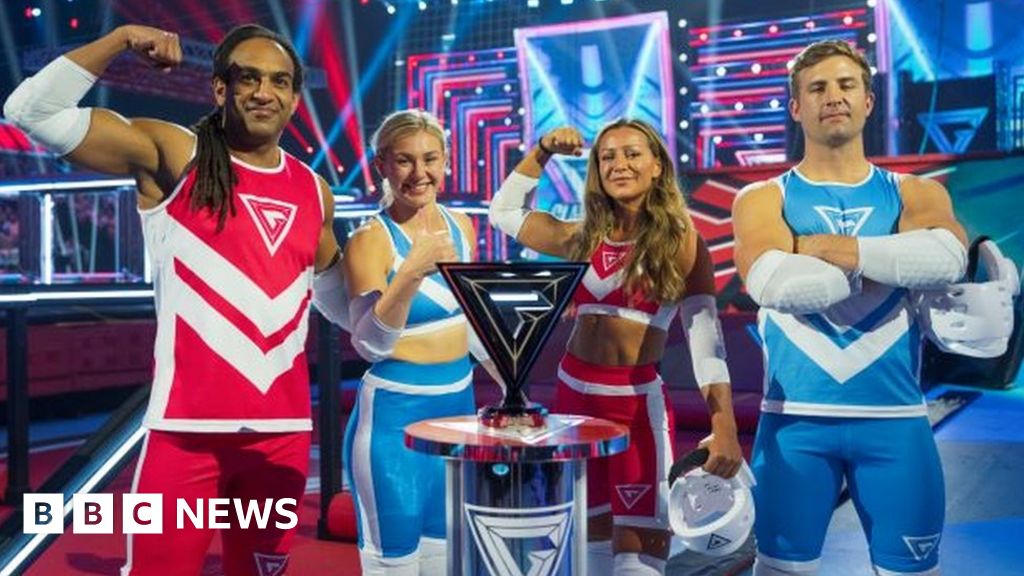- By Noor Nanji
- Culture reporter
Image source, Hungry Bear / BBC
Four finalists, Wesley, Bronte, Marie-Louise and Finlay, are fighting to be crowned champion
The last four contenders are gearing up for Saturday night’s Gladiators final.
Finlay, Wesley, Bronte and Marie-Louise will take to the arena one last time, after 10 weeks of competition.
The reboot of the 1990s show has been a ratings hit, with an average of eight million viewers tuning in each week, and a second series has been confirmed.
“It has been wonderful to hear how much families have loved watching this together,” said Kalpna Patel-Knight, the BBC’s head of entertainment.
She added: “We can’t wait for more action from the Gladiators.”
Image source, Hungry Bear / BBC
The 2024 Gladiators
The current series, which was filmed at the Sheffield Arena, saw the launch of 16 new Gladiators, including Sabre, Legend, Giant and Diamond, who have become fan favourites.
Over the course of the 10 weeks, they have been competing against the contenders in classic events such as Duel and the Eliminator.
Two contenders will be crowned the champions at the end of Saturday’s show, one male and one female.
Finlay, an army officer, said he started the journey “just happy with the opportunity to be on such an iconic show from my childhood”. He added it was “surreal” getting to the final.
That was echoed by Bronte, a firefighter from Sheffield, who described the experience as “crazy”.
“Although I’m a very competitive person, I really wasn’t expecting to get this far into the process and to know I’ve held my own against the Gladiators, I feel really proud of myself,” she said.
The Gladiators, as well as the contenders, have had to train extensively for the series.
For anyone thinking of taking part next time, Wesley, a wrestler, had this advice: “Train for long days and get to know your body, how hard you can push and when to play smart.”
Dublin-born personal trainer Marie-Louise added: “Definitely do it, what have you got to lose?”
Keeping the original format has been key to the show’s success, media experts have said.
“When you watch Gladiators, it’s exactly the same as it was in the 1990s, in terms of the challenges, the music, and the eliminations,” Tom Harrington, an analyst at the media research firm Enders Analysis, told the BBC.
Mr Harrington said that some other revived shows have failed because they’ve “been tinkered with”, to the point that they end up losing what made them good originally.
“With Gladiators, the producers understood what made it great to watch in the first place, and they’ve not messed with that at all.”
First broadcast on ITV on 10 October 1992, Gladiators was like nothing seen before in the prime time Saturday slot.
The Lycra-clad combatants, including Wolf, Warrior, Shadow and Cobra, became household names, while contenders took on an exhausting array of challenges.
The show ran on the network until 2000, before being resurrected by Sky between 2008 and 2009.
The BBC began showing the current series this January, with Bradley Walsh and son Barney presenting.
Compared with when Gladiators started in the 1990s – at a time when there were only a handful of TV slots – there is much more competition for viewers’ attention now.
But the first hour-long episode became the biggest entertainment launch for the BBC in seven years, with about six million viewers. The figure rose to almost 10 million over 28 days with on-demand viewing.
Mr Harrington said the Gladiators reboot had achieved a rare feat of getting families to come together on a Saturday night to watch TV.
“It’s a declining phenomenon,” he said. “Especially when you consider that younger viewers are moving away from TV to short-form video or streaming services.
“But here you have a show that’s on at a particular time slot, and people are tuning in.”

James Parker is a UK-based entertainment aficionado who delves into the glitz and glamour of the entertainment industry. From Hollywood to the West End, he offers readers an insider’s perspective on the world of movies, music, and pop culture.








